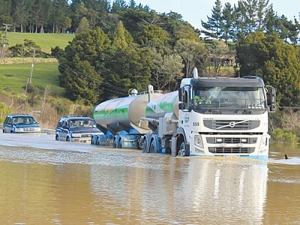BNZ launches First Farm initiative to support aspiring dairy farmers
BNZ says it is backing aspiring dairy farmers through an innovative new initiative that helps make the first step to farm ownership or sharemilking a little easier.
 Farming will be one of the most affected industries by changing weather patterns, according to the Insurance Council.
Farming will be one of the most affected industries by changing weather patterns, according to the Insurance Council.
Financial institutions could lead climate change response before science, says Insurance Council of NZ chief executive Tim Grafton.
The financial incentives offered to customers who mitigate and change will be key drivers.
Farming, forestry and fisheries will be most affected by changing weather patterns in NZ.
"Science as an endeavour is conservative – scientists constrain their worst fears and wait for more evidence before communicating them," Grafton told an Auckland climate change and business conference.
"Their predictions therefore tend to understate risk; the opposite is true in the world of insurance, which looks at the maximum possible loss that can occur."
A food security risk study by the Lloyds and Cambrigde University showed that a strong El Nino in the equatorial and Pacific regions would cause a 400-500% rise in the prices of four staples -- rice, soy, wheat and maize, on which the effect of drought is a 7-11% drop in production.
That brought potential for food riots, trade sanctions, business interruption on a massive scale and terrorism. The consequences of a similar event are now seen in Syria which suffered drought in 2007-2008. Wheat costs went up dramatically, preceding the unrest in North Africa which led to the 'Arab spring'.
The Auckland conference preceded a climate change summit in Paris in December. Diplomats spoke of high expectations of a global agreement.
BNZ chief executive Anthony Healy says every corner of NZ will be impacted by climate change; for the banking sector this translated to big risks and opportunities.
The International Panel on Climate Change pointed out that drought in NZ caused a loss of $3.6b in farm production in 2007-2009.
BNZ banks 22% of the farming sector and has exposure of $58b. It sees itself as having a responsibility to consider impacts now rather than putting it on ice for another 20 years.
Farming customers often raise the issue and are at the 'coalface'. They see weather events every day and regulations which impact on their profits. With dairy prices, they might be focused just
on getting through the short term.
"But as we have seen more and more there are proven links between good environmental management and business successes," Healy says.
BNZ is informing its agri-bankers on climate change issues and customers are showing how to innovate. Creative solutions are needed and sustainability is the biggest driver of innovation in the world today.
A New Zealand dairy industry leader believes the free trade deal announced with India delivers wins for the sector.
The Coalition Government will need the support of at least one opposition party to ratify the free trade deal with India.
Primary sector leaders have welcomed the announcement of a Free Trade Agreement between India and New Zealand.
At Pāmu’s Kepler Farm in Manapouri, mating has wrapped up at the across-breed Beef Progeny Test.
More than 150 people turned up at Parliament recently to celebrate the 20th anniversary of Horticulture New Zealand (HortNZ).
Biosecurity New Zealand says Kiwis should continue to keep an eye out for yellow-legged hornets (Vespa velutina) over the holiday season.